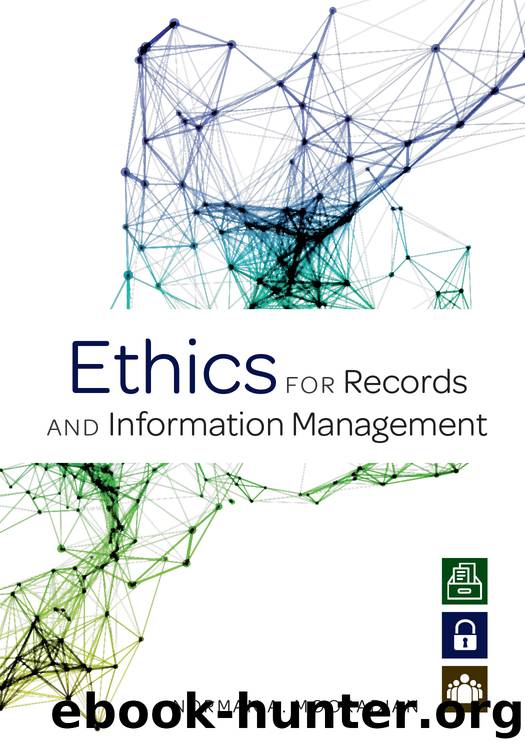Ethics for Records and Information Management by Norman A. Mooradian

Author:Norman A. Mooradian [Mooradian, Norman]
Language: eng
Format: epub
Tags: LAN025010 Language Arts & Disciplines / Library & Information Science / Administration & Management
Publisher: American Library Association
If the purposes stated in the policy are legitimate, the policy should be acceptable to employees. As stakeholders of the organization, they will likely wish for and benefit from its success. Legitimate policies lay down rules that, if followed, contribute to the organizationâs success. Hence, employees should wish to see them enforced. However, the means of advancing the objectives of the policy should be proportionate, and access to employee e-mail communications should not be abused. If, for example, the goal of the organization is to prevent the communication of trade secrets, detection software can be trained specifically on the content of those secrets, and the documents containing high-value proprietary information should be managed in a system with controls so that it is not available to everyone to copy and send. RIM professionals will have an important role in making sure that the means of implementing policies are proportionate to the goals. They are in a position to take full advantage of the tools available to manage critical information so that the organization does not lean too heavily on clumsy and draconian methods. They can also articulate information governance norms such as the business purposes of capture and retention. The result should be a policy that is minimally intrusive, but that fully achieves the goals that inform it.
Similar issues arise with the use of computer and information systems by employees. Employeesâ use of the Internet is a legitimate concern of organizations, since employees can be engaging in activities that create legal liabilities and that infringe on the rights of other stakeholders. Employees may be violating copyright by downloading content, or they may be creating a hostile environment by viewing pornographic material. They may also be wasting time by shopping, watching entertaining videos, or engaging in personal social interactions on a social media platform. This kind of behavior is inappropriate for employees as stakeholders of an organization who should be concerned about its well-being. However, the ethical questions that arise concern the means of preventing such behavior. For example, if the means of monitoring employee behavior is deceptive, the company will be transgressing the moral rule against deception and will be undermining the employeesâ autonomy. Moreover, control mechanisms can have the effect of limiting employeesâ autonomy. The means of preventing inappropriate behavior should be proportionate to the risk, and the risk should be mitigated by the least intrusive means available. Also, these means should be chosen in light of what is best for the employees and the company. An approach to compliance that encourages appropriate behavior in a positive way and that encourages an ethical work culture can produce good results for the organization while also promoting employeesâ development and personal growth.
RIM professionals should be critical players in the effort to develop acceptable control mechanisms on computer use, including the development of clear policies and effective training programs; controls on systems that can prevent abuse, such as the blocking of inappropriate websites; and methods of holding violators of policy accountable. If, for
Download
This site does not store any files on its server. We only index and link to content provided by other sites. Please contact the content providers to delete copyright contents if any and email us, we'll remove relevant links or contents immediately.
The Future Internet by Bernard Marr(541)
Focus Group Methodology by Pranee Liamputtong(506)
Python for Finance Cookbook by Lewinson Eryk;(470)
Empowering Public Speaking by Deanna L. Fasset & Keith Nainby(436)
Doing business with Japan : successful strategies for intercultural communication by Kazuo Nishiyama(413)
Global Orders and Civilizations : Perspectives from History, Philosophy and International Relations by Sadik Unay; Muzaffer Senel(341)
Engaging with Ethics in International Criminological Research by Michael Adorjan Rose Ricciardelli(326)
Intentional Power: The 6 Essential Leadership Skills For Triple Bottom Line Impact by Lisen Stromberg & JeanAnn Nichols & Corey Jones(293)
Analysis of Financial Statements by Frank J. Fabozzi & Frank J. Fabozzi(289)
The Economics of Banking by Jin Cao(287)
The Three Skills of Top Trading by Hank Pruden(282)
Entrepreneurial Marketing by unknow(279)
Focus on Teaching by Jim Knight(263)
The Oxford Handbook of Banking and Financial History by Youssef Cassis;Richard S. Grossman;Catherine R. Schenk;(256)
Data Science and Analytics for SMEs: Consulting, Tools, Practical Use Cases by Afolabi Ibukun Tolulope(251)
New India by Arvind Panagariya(248)
Building a Career in Cybersecurity: The Strategy and Skills You Need to Succeed by Yuri Diogenes(241)
Financial Statement Analysis by Martin S. Fridson;Fernando Alvarez; & Fernando Alvarez(240)
Maximum Success with LinkedIn by Dan Sherman(226)
